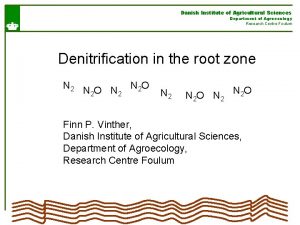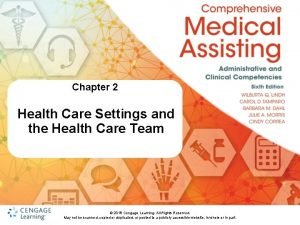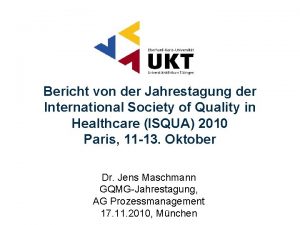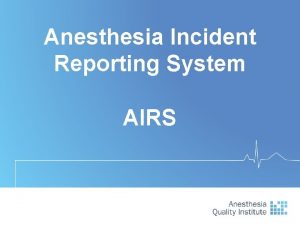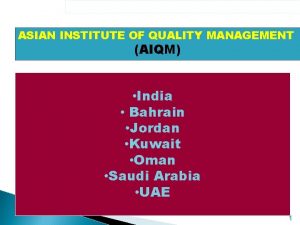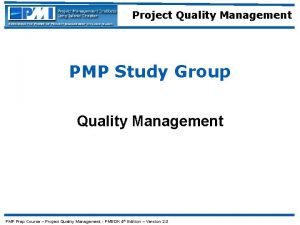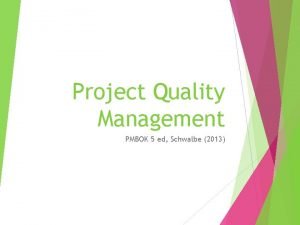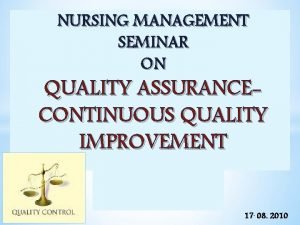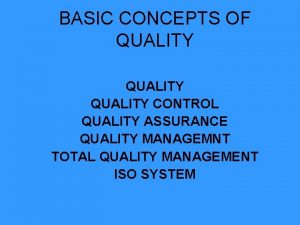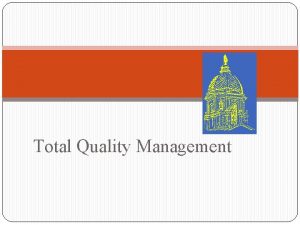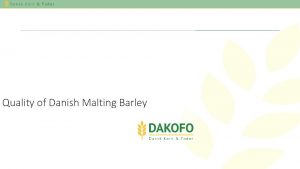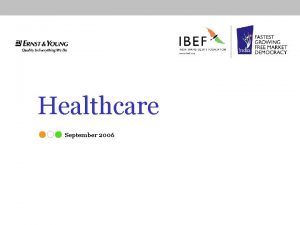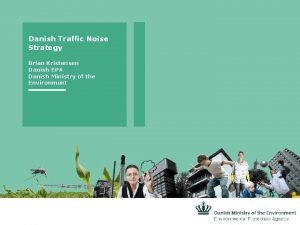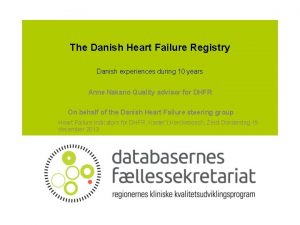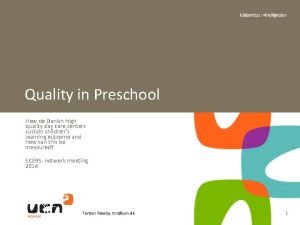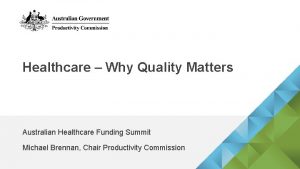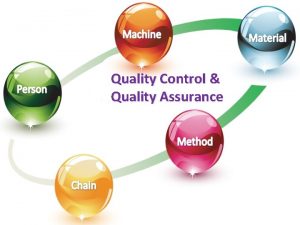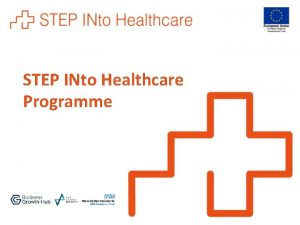The Danish Healthcare Quality Programme Danish Institute for






























- Slides: 30

The Danish Healthcare Quality Programme Danish Institute for Quality and Accreditation in Healthcare; www. ikas. dk 1 01. August 2019

Prehistory Danish Institute for Quality and Accreditation in Healthcare; www. ikas. dk 2 01. August 2019

Intentions of DDKM • Nationwide model • Evaluating and supporting quality improvements • Including publically financed health services • Danish standards – on an international level • Promoting good patient journeys Danish Institute for Quality and Accreditation in Healthcare; www. ikas. dk 3 01. August 2019

Preconditions • A quality culture should be promoted in the entire healthcare sector • ”You can make staff work in a certain way with specific tasks for a while, but fostering a quality culture is different from and more than executing individual tasks” • In other words: a concern for leaders on all levels Danish Institute for Quality and Accreditation in Healthcare; www. ikas. dk 4 01. August 2019

What have we accomplished (Aug 2019)? • Published accreditation standards for • • • Hospitals (1. and 2. version) Private hospitals and clinics (adopted version of hospital standards) Community pharmacies (1. , 2. and 3. version) Community based healthcare (1. and 2. version) The prehospital sector (1. , 2. and 3. version) General practitioners (1. version) Specialist physician practice (1. and 2. version) Chiropractors (1. version) Chiropodists (1. version) Physiotherapist (1. version) Dentists (1. version) and dental hygienists (1. version) Psychologists (1. version) • Supported clients by courses, counselling and ressource materials • Developed a survey model and trained more than 250 surveyors • Conducted more than 3000 surveys / Danish Institute for Quality and Accreditation in Healthcare; www. ikas. dk 5 01. August 2019

Active accreditation programmes (Aug 2019) • Private hospitals and clinics (3. cycle 2016 -2019) • Community pharmacies (4. cycle 2019 -2021) • Community based healthcare (offered ad hoc) • The prehospital sector (offered ad hoc) • Specialist physician practice (2. cycle 2019 -2021) • Chiropractors (1. cycle 2018 -2019 • Chiropodists (1. cycle 2019 -2021) • Physiotherapist (1. cycle 2019 -2021) • Psychologists (1. cycle 2020 -2021) More information at https: //www. ikas. dk/den-danske-kvalitetsmodel/ddkm-in-english/introduction-to-ddkm/ Danish Institute for Quality and Accreditation in Healthcare; www. ikas. dk 6 01. August 2019

The structure of an accreditation standard in DDKM • The standard heading expresses and the fields ”purpose” and ”content” of the standard explain, what we aim to achieve • The elements describe, how we will evaluate the client’s effort to achieve this aim Danish Institute for Quality and Accreditation in Healthcare; www. ikas. dk 7 01. August 2019

DDKM is not based on the assumption that everything should be fixed by documented procedures • Everyone should share a common view on, how given tasks should be performed – including on, when there is one single way to do it • Documentation serves two purposes: • • To ensure that we agree on, what we have agreed on To help us remember, when we need to • Documentation of procedures should be ”just enough” Danish Institute for Quality and Accreditation in Healthcare; www. ikas. dk 8 01. August 2019

Data is collected for different purposes • Signals to make sure that we are on the right track (when caring for a single patient, or as an organization) • Investigation and follow up, when improvement is desired and implemented Danish Institute for Quality and Accreditation in Healthcare; www. ikas. dk 9 01. August 2019

Outcome or process measurement? • Outcome measures, when we wish to assert that we have achieved, what we aimed for Process measures tightly coupled to an outcome may also be used for this purpose • Process measures, when we wish to understand, why our outcomes are as they are Danish Institute for Quality and Accreditation in Healthcare; www. ikas. dk 10 01. August 2019

Don’t mistake the means for the end • The quality criterion is not ”correct procedure”, but ”desired outcome” And look at the performance of the whole system from the perspective of the service user Danish Institute for Quality and Accreditation in Healthcare; www. ikas. dk 11 01. August 2019

Two related but different purposes of an accreditation survey • To evaluate, if the client meets the miminal requirements inherent in the accreditation standards – and consequently can be awarded accreditation • To give the client feedback on the efforts to achieve the aim of the accreditation standards – in a way that stimulates and inspires to further quality improvement – identify opportunities for improvement This may be relevant even in situations, where no follow up is needed, before accreditation can be awarded Danish Institute for Quality and Accreditation in Healthcare; www. ikas. dk 12 01. August 2019

The minimal requirement can be stated explicitly in the standard – or it can set by a regulatory or professional norm Examples: • Regulatory norms for the medication process, identification of patients, or infection hygiene • Professional standards for sedation without the involvement of anaesthesiological staff Danish Institute for Quality and Accreditation in Healthcare; www. ikas. dk 13 01. August 2019

Some standards do not set an identifiable minimum level, but point out a direction • For example standards on involving service users and their families in care decisions Danish Institute for Quality and Accreditation in Healthcare; www. ikas. dk 14 01. August 2019

Many elements of DDKM are explorative questions ”When interviewed, managers and staff can account for XXX” Surveyors should • Take an explorative (”curious”) approach • Show respect for other people’s solutions But there is a need to avoid that any answer is considered right Danish Institute for Quality and Accreditation in Healthcare; www. ikas. dk 15 01. August 2019

The importance of the accreditation standard to the service user can be direct or indirect Examples: • Direct: Cardiac arrest, use of clinical guidelines • Indirect: Quality improvement, risk management, staff competencies Danish Institute for Quality and Accreditation in Healthcare; www. ikas. dk 16 01. August 2019

The elements should not be interpreted as rigid prescriptions We subscribe to the excellent way this was expressed by the Royal Australian College of General Practitioners: “The RACGP envisages that formal accreditation against the RACGP Standards will be based on common sense and will not seek to penalise or exclude practices on the basis of technicalities. ” (From the introduction to the RACGP standards for general practice) Danish Institute for Quality and Accreditation in Healthcare; www. ikas. dk 17 01. August 2019

Triangulation is the cornerstone of survey methodology • What can the person responsible for the task tell or demonstrate? • Is the surveyor able to find ”traces” from situations, where this task was performed? • • Patient records Other documents Direct observation Interviews with patients or patient relatives • What is done to support that the task is performed as intended? • • • Guidelines and written instructions Checklists Support built into the workflow (for example IT interfaces) Danish Institute for Quality and Accreditation in Healthcare; www. ikas. dk 18 01. August 2019

What meaning should patients or the public attribute to accreditation? • ”A clinic that works in a sensible way; one that we can trust” • IKAS does not ascertain that everything in the records is OK • DDKM should not be understood as a system that implies that ”someone” should document and check compliance with fixed procedures at all times • IKAS cannot guarantee that everything will be OK in the future Danish Institute for Quality and Accreditation in Healthcare; www. ikas. dk 19 01. August 2019

Impact of DDKM Danish Institute for Quality and Accreditation in Healthcare; www. ikas. dk 20 01. August 2019

Impact of hospital accreditation, 1 st cycle Follow up needed after initial survey visit in: • 26/39 public hospitals • 29/37 private hospitals After having an opportunity for follow up everything resolved in: • 39/29 public hospitals • 34/37 private hospitals ”Not accredited” after an opportunity for follow up: • None First hospital accreditation cycle, 2010 -2012 Danish Institute for Quality and Accreditation in Healthcare; www. ikas. dk 21 01. August 2019

Impact of clinic accreditation, 1 st cycle Interim results as some follow up not completed Follow up needed after initial survey visit in: • 33% of GP clinics • 22% of specialist physician clinics After having an opportunity for follow up everything resolved in: • 97. 4% of GP clinics • 98. 5% of specialist physician clinics ”Not accredited” after an opportunity for follow up: • 17/1517 GP clinics • 5/859 specialist physician clinics Danish Institute for Quality and Accreditation in Healthcare; www. ikas. dk 22 01. August 2019

Independent research on impact (public hospitals) – (1) • Comparison of hospitals participating or not in pre-DDKM accreditation showed no difference in performance measures (stroke, heart failure, ulcer) • Lower 30 day mortality at fully compared to partially accredited hospitals (adjusted mortality, OR 0. 83 (0. 72 -0. 96)) and at hospitals compliant vs non-compliant with four previously selected standards • Shorter LOS at fully compared to partially accredited hospitals (moderate effect only) • No difference in acute readmissions • High compliance with accreditation standards associated with more evidencebased hospital care Danish Institute for Quality and Accreditation in Healthcare; www. ikas. dk 23 01. August 2019

Independent research on impact (public hospitals) – (2) • Stepped-wedge study supporting the view that mandating an accreditation system and applying accompanying standards are associated with improved quality of hospital care • Persistent low compliance (over two consecutive cycles) with the DDKM associated with higher 30 -day mortality and longer length of stay Danish Institute for Quality and Accreditation in Healthcare; www. ikas. dk 24 01. August 2019

Findings in GP clinics • Top 5 indicators • • Reprocessing of medical equipment Reception and communication of results from diagnostic services • • • Correct procedure for patient identification Patient record audit Intervention targeted at self selected group of vulnerable patients (ensure information of patient; react if result is not received as expected) Based on 1120 survey reports finalized by 25 May 2018 Danish Institute for Quality and Accreditation in Healthcare; www. ikas. dk 25 01. August 2019

Bibliography – peer reviewed research on accreditation in Denmark (1) • SB Bogh et al: Accreditation and improvement in process quality of care: a nationwide study. Int J Qual Health Care 2015, 27, 336 -343 • AM Falstie-Jensen et al: Compliance with hospital accreditation and patient mortality: A Danish nationwide population-based study. Int J Qual Health Care 2015, 27, 165 -174 • AM Falstie-Jensen et al: Is compliance with hospital accreditation associated with length of stay and acute readmission: A Danish nationwide population-based study. Int J Qual Health Care 2015, 27, 451 -458 • SB Bogh et al: Improvement in quality of hospital care during accreditation: A nationwide stepped-wedge study. Int J Qual Health Care 2016, 28, 715 -720 • FB Waldorff et al: Almost half of the Danish general practitioners have negative a priori attitudes towards a mandatory accreditation programme. Dan Med J 2016, 63(9), A 5266. • LH Ehlers et al: Unannounced versus announced hospital surveys: a nationwide clusterrandomized controlled trial. Int J Qual Health Care 2017, 29, 406 -411 • LH Ehlers et al: Attitudes towards accreditation among hospital employees in Denmark: a cross-sectional survey. Int J Qual Health Care 217, 29, 693 -698 Danish Institute for Quality and Accreditation in Healthcare; www. ikas. dk 26 01. August 2019

Bibliography – peer reviewed research on accreditation in Denmark (2) • Engel C, Andersen HB. Side effects of overdoing it: lessons from a comprehensive hospital accreditation programme. In: Researching Patient Safety and Quality in Healthcare: A Nordic Perspective. Eds: Aase K, Schibevaag L, CRC Press, 2017 • AM Falstie-Jensen et al: Compliance with accreditation and recommended hospital care a Danish nationwide population-based study. Int J Qual Health Care 2017, 29, 625 -633 • SB Bogh et al: Predictors of the effectiveness of accreditation on hospital performance: A nationwide stepped-wedge study. Int J Qual Health Care 2017, 29, 477 -483 • Andersen et al: Accreditation in general practice in Denmark: study protocol for a cluster -randomized controlled trial. Trials 2017, 18, 69 • LB Pedersen et al: Can external interventions crowd in intrinsic motivation? A cluster randomised field experiment on mandatory accreditation of general practice in Denmark. Social Science & Medicine 2018, 211, 224 -233 • AM Falstie-Jensen et al: Consecutive cycles of hospital accreditation: Persistent low compliance associated with higher mortality and longer length of stay. Int J Qual Health Care 2018, 30, 382 -389 Danish Institute for Quality and Accreditation in Healthcare; www. ikas. dk 27 01. August 2019

Bibliography – peer reviewed research on accreditation in Denmark (3) • Andersen MK et al. : Retirement, job satisfaction and attitudes towards mandatory accreditation: a Danish survey study in general practice. BMJ Open 2018; 8: e 020419. doi: 10. 1136/ bmjopen-2017 -020419 • A Nicolaisen et al: Managers’ perceptions of the effects of a national mandatory accreditation program in Danish hospitals. A cross-sectional survey. Int J Qual Health Care 2019, 31, 331 -337 Results from a large ongoing research project on accreditation in general practice in Denmark are reported here: https: //www. akiap. dk/? page_id=106 Oral presentations and posters at ISQua and other conferences Danish Institute for Quality and Accreditation in Healthcare; www. ikas. dk 28 01. August 2019

More information and resources, including translations of some standard sets, can be found at https: //www. ikas. dk/den-danske-kvalitetsmodel/ddkm-in-english/introduction-to-ddkm/ Danish Institute for Quality and Accreditation in Healthcare; www. ikas. dk 29 01. August 2019

IKAS is accredited by IEEA (ISQua) for the third time Danish Institute for Quality and Accreditation in Healthcare; www. ikas. dk 30 01. August 2019
 Danish institute of agricultural sciences
Danish institute of agricultural sciences Healthcare and the healthcare team chapter 2
Healthcare and the healthcare team chapter 2 Healthcare and the healthcare team chapter 2
Healthcare and the healthcare team chapter 2 Va healthcare leadership talent institute
Va healthcare leadership talent institute International society for quality in healthcare
International society for quality in healthcare Anesthesia quality institute
Anesthesia quality institute Aiqm india
Aiqm india Quality assurance vs quality control
Quality assurance vs quality control Pmp quality vs grade
Pmp quality vs grade Pmp gold plating
Pmp gold plating Ana quality assurance model
Ana quality assurance model Quality improvement vs quality assurance
Quality improvement vs quality assurance Basic concepts of quality control
Basic concepts of quality control Gurus of total quality management
Gurus of total quality management Crosby quality is free
Crosby quality is free Old quality vs new quality
Old quality vs new quality Fspos
Fspos Typiska novell drag
Typiska novell drag Tack för att ni lyssnade bild
Tack för att ni lyssnade bild Returpilarna
Returpilarna Shingelfrisyren
Shingelfrisyren En lathund för arbete med kontinuitetshantering
En lathund för arbete med kontinuitetshantering Adressändring ideell förening
Adressändring ideell förening Tidbok
Tidbok Sura för anatom
Sura för anatom Densitet vatten
Densitet vatten Datorkunskap för nybörjare
Datorkunskap för nybörjare Boverket ka
Boverket ka Hur skriver man en debattartikel
Hur skriver man en debattartikel För och nackdelar med firo
För och nackdelar med firo Nyckelkompetenser för livslångt lärande
Nyckelkompetenser för livslångt lärande
